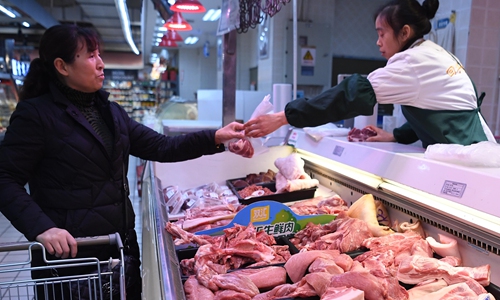HOME >> SOURCE
China’s Feb CPI may reach 6% stressed by COVID-19: analyst
Source:Global Times Published: 2020/2/27 18:37:05 Last Updated: 2020/2/28 0:31:25

A resident buys pork in a supermarket in Southwest China's Chongqing Municipality on Monday. Photo: cnsphotos
China's consumer price index (CPI) is likely to elevate in February, and may hover around 6 percent, mainly pushed by the COVID-19 outbreak, Chinese analysts say, while stressing that a surge in the CPI does not necessarily mean inflation.
China's January CPI expanded by 5.4 percent from a year earlier, the steepest rise in more than eight years.
A swine fever in 2019 forced pork prices to soar, and the sudden assault of the coronavirus together pushed CPI to 5.4 percent last month, Cong Yi, a professor at Tianjin University of Finance and Economics, told the Global Times on Thursday.
"The virus outbreak has pushed up costs. Due to labor shortages in some areas, costs of transportation have risen. For example, freight costs have doubled, and payment for freight drivers has increased by 5-7 times," Wang Bin, deputy director of the Department of Market Operation and Consumption Promotion of the Ministry of Commerce, said at press conference in Beijing on Thursday.
Cong predicted that the February CPI is likely to surpass the 5.4 percent level in January, and may even reach 6 percent since food prices will still remain at a high level.
However, Cong noted that the surge does not mean inflation, and the figures in January and February are not typical and are mainly impacted by the virus.
"Food prices will soon fall back if factories resume production and logistics gradually get back to normal," Cong said.
With the implementation of tax cut measures, recovery of logistics and an increase of agricultural products supply, prices will fall steadily, Wang Bin, the official said.
According to the Ministry of Commerce, the wholesale prices of grain and edible oil in the 100 large-scale agricultural markets on Wednesday were unchanged from the previous day, which were 0.9 percent lower than those at the end of January.
Wang said that there's no need to worry about shortages during the rest of the year, as China's grain output in 2019 reached 664 million tons, up 0.9 percent year-on-year, a record high. Meat, eggs, vegetables, and fruits production have maintained stable growth.
Hog production, which was severely impacted due to the African swine fever over the past year, is also recovering, Wang said.